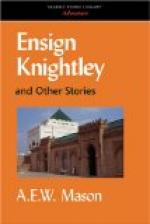THE COWARD.
I.
“Geoffrey,” said General Faversham, “look at the clock!”
The hands of the clock made the acutest of angles. It was close upon midnight, and ever since nine the boy had sat at the dinner-table listening. He had not spoken a word, indeed had barely once stirred in the three hours, but had sat turning a white and fascinated face upon speaker after speaker. At his father’s warning he waked with a shock from his absorption, and reluctantly stood up.
“Must I go, father?” he asked.
The General’s three guests intervened in a chorus. The conversation was clear gain for the lad, they declared,—a first taste of powder which might stand him in good stead at a future time. So Geoffrey was allowed furlough from his bed for another half-hour, and with his face supported between his hands he continued to listen at the table. The flames of the candles were more and more blurred with a haze of tobacco smoke, the room became intolerably hot, the level of the wine grew steadily lower in the decanters, and the boy’s face took a strained, quivering look, his pallour increased, his dark, wide-opened eyes seemed preternaturally large.
The stories were all of that terrible winter in the Crimea, now ten years past, and a fresh story was always in the telling before its predecessor was ended. For each of the four men had borne his share of that winter’s wounds and privations. It was still a reality rather than a memory to them; they could feel, even in this hot summer evening and round this dinner-table, the chill of its snows, and the pinch of famine. Yet their recollections were not all of hardships. The Major told how the subalterns, of whom he had then been one, had cheerily played cards in the trenches three hundred yards from the Malakoff. One of the party was always told off to watch for shells from the fort’s guns. If a black speck was seen in the midst of the cannon smoke, then the sentinel shouted, and a rush was made for safety, for the shell was coming their way. At night the burning fuse could be seen like a rocket in the air; so long as it span and flew, the card-players were safe, but the moment it became stationary above their heads it was time to run, for the shell was falling upon them. The guns of the Malakoff were not the rifled guns of a later decade. When the Major had finished, the General again looked at the clock, and Geoffrey said good-night.
He stood outside the door listening to the muffled talk on the other side of the panels, and, with a shiver, lighted his candle, and held it aloft in the dark and silent hall. There was not one man’s portrait upon the walls which did not glow with the colours of a uniform,—and there were the portraits of many men. Father and son the Faversham’s had been soldiers from the very birth of the family. Father and son,—no steinkirks and plumed




